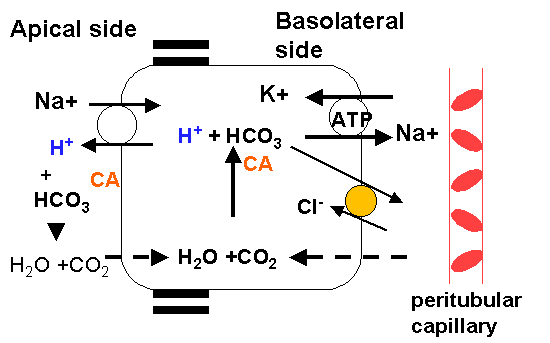Do The Kidneys Excrete Bicarbonate
Because the rate of glomerular filtration is maintained at a fairly constant level specific regulation of bicarbonate excretion is principally achieved by modulation of its tubular. Bicarbonate as a base neutralizes hydrogen ions in the blood.
Urinary Regulation Of Acid Base Balance Teachmephysiology
Bicarbonate is the predominant extracellular buffer against the fixed acids and it important that its plasma concentration should be defended against renal loss.

Do the kidneys excrete bicarbonate. The kidneys are slower to compensate than the lungs but renal physiology has several powerful mechanisms to control pH by the excretion of excess acid or base. They excrete hydrogen ions into urine. They reabsorb bicarbonate from urine.
Excretion of H ions in the urine and the reabsorption of bicarbonate into blood plasma. The kidneys regulate the HC03- by. Respiratory alkalosis occurs when the lungs are blowing off more carbon dioxide than the body is producing.
The kidneys compensate for respiratory alkalosis by _____. Renal Conservation of HCO 3-. The kidneys maintain blood pH by controlling the amount of bicarbonate which is a base that is excreted from the body.
The kidneys help maintain the acidbase balance by excreting hydrogen ions into the urine and reabsorbing bicarbonate from the urine. Hypoventilation occurs raising CO2 levels and lowering pH. Healthy kidneys remove acid from the body through urine and they keep the right amount of bicarbonate base in the blood.
The kidneys have two very important roles in maintaining the acidbase balance. Through a carbonic anhydrase reaction similar to the red blood cells hydrogen ions get produced and secreted into the lumen of the nephron. Conserving H and bicarbonate ion c.
Whatever the form secretion of hydrogen is always accompanied by generation of a novel bicarbonate molecule which is subsequently added to the ECF. 2 producing new HCO 3-which enters the body fluids as the kidneys excrete ammonium salts and titratable acids this sum is called net acid in the urine. The kidney cells produce a constant amount of hydrogen ion and bicarbonate because of their own cellular metabolism production of carbon dioxide.
You can probably guess by now that the secretion of. Consequently elimination of hydrogen by the kidneys is always accompanied by replenishment of the Weak Base form of the bicarbonate buffer in the extracellular fluid. The kidneys excrete bicarbonate a base and retain hydrogen ion an acid.
Healthy kidneys help keep your bicarbonate levels in balance. Because bicarbonate is not secreted by the tubule the rate of renal bicarbonate excretion is ultimately determined by the balance between its rate of glomerular filtration and tubular resorption. Conserving H and excreting bicarbonate ion d.
There is a second extremely important role that the kidneys play in acid-base balance namely the reabsorption of the filtered bicarbonate. The kidneys have two very important roles in maintaining the acidbase balance. They excrete hydrogen ions into urine.
Buffer systems prevent significant changes in blood pH proteins phosphates and the bicarbonate system. Since the blood pH is too basic in these conditions the kidneys excrete bicarbonate to try and compensate. RENAL REGULATION OF BICARBONATE.
Furthermore how does the kidney excrete hydrogen ions. They reabsorb bicarbonate from urine. But in CKD the kidneys cant remove enough acid which can lead to.
This usually occurs from hyperventilation. A small group of studies have shown that treatment with sodium bicarbonate or sodium citrate. The kidneys are slower to compensate than the lungs but renal physiology has several powerful mechanisms to control pH by the excretion of excess acid or base.
If acid is excreted in the urine its is in effect removed from the blood when an equal quantity of bicarbonate is added to the blood. Hydrogen ions are removed by the proximal convoluted tubules PCTs and collecting tubules CTs that are part of the nephrons of the kidneys. Low bicarbonate levels less than 22 mmoll can also cause your kidney disease to get worse.
Conserving bicarbonate ion and excreting H b. Excreting H and bicarbonate ion. The kidneys also control the amount of acids excreted from the body.
1 conserving or excreting the HC0 3 - present in the glomerular ultrafiltrate.
Renal Control Of Acid Base Balance
How Potassium Citrate Pills Work Kidney Stone Evaluation And Treatment Program
Molecular Mechanisms Of Bicarbonate Reabsorption In Proximal Tubule Download Scientific Diagram
2 4 Renal Regulation Of Acid Base Balance Continued
Reclaiming Bicarbonate Via Acid Excretion Eclinpath
Acid Base Balance Renal Bicarbonate Reabsorption Abdominal Key
Defective Bicarbonate Reabsorption In Kir4 2 Potassium Channel Deficient Mice Impairs Acid Base Balance And Ammonia Excretion Sciencedirect
Uraemic Acidosis The Mixed Acidosis Of Renal Failure Deranged Physiology
Renal Regulation Of Metabolic Acidosis And Alkalosis
Secretion Of Hydrogen Ions And Reabsorption Of Bicarbonate Ions By The Renal Tubules
The Role Of The Kidney In Acid Base Balance Osmosis
Renal Regulation Of Metabolic Acidosis And Alkalosis
4 4 Renal Regulation Of Acid Base Balance Medicine Libretexts
Renal Regulation Of Metabolic Acidosis And Alkalosis
The Role Of The Kidney In Acid Base Balance Osmosis
Acid Base Balance Anatomy And Physiology Ii
Post a Comment for "Do The Kidneys Excrete Bicarbonate"